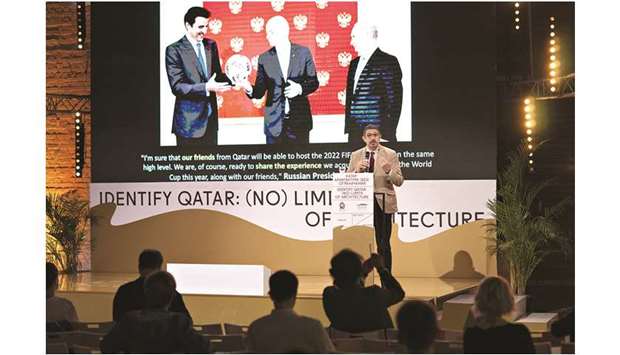The Strelka Institute for Media, Architecture, and Design hosted the ‘Identify Qatar: (No) Limits of Architecture’ conference recently in Moscow.
Leading international architects and city planners took the floor to talk about innovative architectural projects in Qatar, define similarities between construction in northern Russia and Doha, as well as about the most spectacular buildings in the State.
The conference opened with a word of welcome by Qatar’s ambassador to Russia, Fahad bin Mohamed al-Attiyah. He also held a Q&A session with leading Middle Eastern architect Abdelwahed Elwakil.
Among the speakers were Ibrahim Mohamed I Jaidah, creator of a kufi (traditional cap)-like 2022 FIFA World Cup stadium in Qatar, Salman al-Mohannadi, CEO of Barwa Group and Ali Abdelrouf Ali Abouelsaad, professor of architecture and urbanism, head of R&D Urban Planning Department - Ministry of Municipality and Environment.
During the lecture, ‘Past, Future and Present of Qatar Architecture’, Jaidah, CEO of Arab Engineering Bureau Qatar, told the audience how the architecture of Qatar had changed from the pre-oil to post-oil era and whether it was possible to build a glass-and-concrete skyscraper while sticking to traditions.
The lecture, ‘Architecture between Tradition and Modern Times’, by Abdelwahed Elwakil, an architect and adviser at Barwa Group was dedicated to the creation of authentic forms at a fraction of the price, the benefits of old engineering methods and Arab neo-classicism.
At the panel discussion on ‘Construction under Extreme Conditions’, al-Mohannadi as well as Monika Konrad, project director at Strelka KB, Mikhail Alekseyevskiy, head of Strelka KB Centre for Urban Anthropology, and Ville Hara, member of the Finnish Architects Association and founder Avanto Architects, presented their projects on public spaces in different areas and discussed what city planners from the south could teach the north, if there was a universal approach to building among ice and sand, and how harsh conditions could help set the rules.
Abouelsaad spoke during the public interview, ‘From Big Construction to Big Life’.
He explained how mega projects such as Education City, the Museum of Islamic Art, National Museum of Qatar, The Pearl-Qatar and the 2022 FIFA World Cup stadiums had changed the physical and cultural landscape of the capital city of Qatar.
“Within the Qatar-Russia 2018 Year of Culture, it has been important for us to provide an opportunity for exchanging experience and knowledge between our countries, especially in the field of architecture and urban development. The pursuit of innovation, combined with deep respect for our historical heritage, is what unites our nations,” said al-Attiyah.
More than 800 visitors attended the conference, while more than 400 watched it online.

Ali Abdelrouf Ali Abouelsaad addressing the audience in Moscow.
